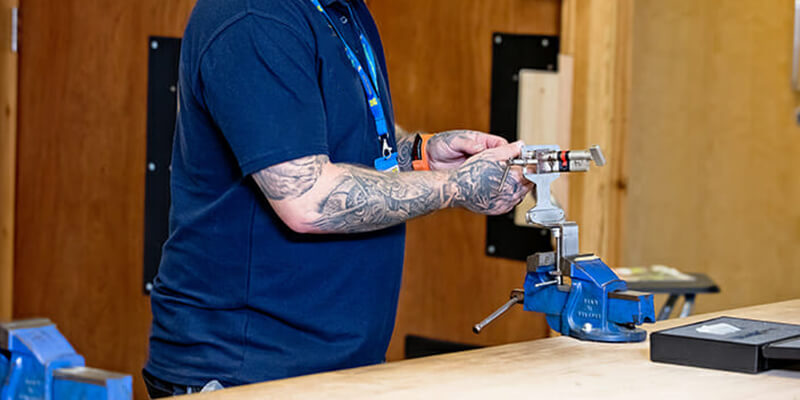Locksmithing is an age-old profession, requiring a specialized skill set ranging from key duplication to installation of high-security lock systems. Yet, the journey from an apprentice to a master in this field isn’t achieved overnight; it’s a gradual process that involves gaining knowledge, accumulating experience, and earning crucial certifications.
Understanding the Locksmith Profession
A locksmith’s role goes beyond just lock and key. Today, locksmiths are security professionals who ensure the safety and security of homes, businesses, and institutions. They are adept at:
- Installing, repairing, and adjusting locks and security devices
- Key cutting and duplication
- Providing emergency lockout services
- Installing electronic security systems
Step 1: Start as an Apprentice
Entering the field of locksmithing usually begins with an apprenticeship. Here, aspirants work under the guidance of experienced locksmiths to learn the trade’s practical aspects. This hands-on approach provides them with valuable insight into how various locking systems work, from traditional deadbolts to sophisticated electronic locks.
Step 2: Attaining a Locksmith Certificate
The next step in this journey is to attain a Locksmith Certificate. The locksmith certification programs are designed to equip aspiring locksmiths with the necessary theoretical knowledge to complement their practical skills. These programs often cover subjects like:
- Basics of locksmithing
- Types of locks and keys
- Installation and repair techniques
- Security systems and alarm installation
- Legal and business aspects of locksmithing
Importance of Locksmith Certification
Earning a locksmith certification can offer numerous benefits, such as:
- Enhancing Credibility: A certified locksmith is often more trusted by clients as it indicates that the locksmith has met a certain standard of knowledge and competence.
- Increasing Employability: Employers often prefer hiring certified locksmiths, as they are perceived as being more proficient and reliable.
- Higher Earning Potential: Locksmiths with certifications generally have the potential to earn more than their non-certified counterparts.
Step 3: Gaining Work Experience
Joining a Locksmith Company
After obtaining a locksmith certificate, the immediate next step typically involves stepping into the professional realm. This often means joining an established locksmith company. This pathway provides the opportunity to apply theoretical knowledge into practice, work with experienced professionals, and understand the nuances of customer service in the locksmithing industry.
Specializing in Different Areas
With time and work experience, locksmiths often find areas within the field that they are particularly interested in. Specialization can add an extra layer of expertise to a locksmith’s profile. Some of the common areas of specialization include:
- Automotive Locksmithing: This involves working with vehicle locks and security systems. Automotive locksmiths are skilled in tasks like key duplication for cars, repairing car locks, and unlocking vehicles without causing damage.
- Safe Work: This specialization involves working with safes and vaults. It requires knowledge of different types of safes, their locking mechanisms, and how to repair, open, and install them.
- Electronic Security: In this digital age, many locksmiths are choosing to specialize in electronic security. This area covers the installation, repair, and maintenance of electronic security systems, including access control systems and security alarms.
Step 4: Pursuing Further Certifications
The Need for Advanced Certifications
Advanced certifications are highly beneficial for locksmiths who wish to further prove their competency or specialize in the field. These certifications validate a locksmith’s specialized skill set, showcasing a level of expertise that goes beyond the basics. Having advanced certifications on your profile can significantly increase a locksmith’s marketability, setting them apart from others in the field.
Types of Advanced Certifications
Depending on the locksmith’s area of interest or specialization, there are various advanced certifications to consider. Some of these might include:
- Certified Registered Locksmith (CRL): This certification is a step above the basic locksmith certification and requires the successful completion of ten mandatory categories, including key duplication and lock installation.
- Certified Professional Locksmith (CPL): To achieve this certification, a locksmith must pass an examination in 18 different locksmithing categories.
- Certified Master Locksmith (CML): This is the highest level of certification, requiring proficiency in 90% of the categories identified by the certifying organization.
The Benefits of Advanced Certifications
- Recognition of Expertise
- Enhanced Career Opportunities
- Increased Trust from Clients
Master Locksmith: The Ultimate Goal
The ultimate goal for many in this profession is to become a Master Locksmith. This title is bestowed upon those who have demonstrated exceptional skill and knowledge in various locksmithing disciplines. Achieving this level of certification signifies mastery of the craft and can open the door to numerous professional opportunities.
Conclusion: The Journey is Worth It
While the path from apprentice to master locksmith might seem long, each step contributes to the individual’s skill set, making them more adept at addressing diverse security needs. It’s a journey that requires patience, persistence, and a commitment to continuous learning. Yet, the rewards – both personal and professional – make the pursuit of locksmith certification worth every effort.

